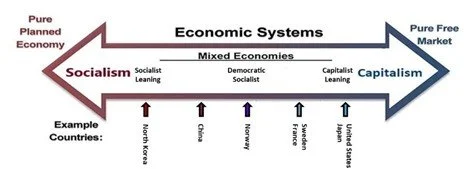Capitalism Isn’t Working
“Pure capitalism is a myth and it clearly does not work. ”
With the election of Democratic Socialist, Zohran Mamdani, to mayor of New York City, the socialism vs. capitalism debate has risen once again. However, this debate is a mute point because we’re not being honest about the definitions of capitalism or an effective economy. Furthermore, if the point of capitalism is to be competitive, why do we refuse to improve?
The U.S. is Not a Capitalist State
Pure capitalism, or a laissez-faire free market, involves minimal government intervention, private ownership of the means of production, and voluntary exchange guided by competition. The U.S. economy deviates from this definition in many ways:
Government Intervention: The U.S. government is the single largest purchaser within the U.S. economy. Its military spending is larger than all NATO members combined. Approximately 73% of Lockheed Martin’s revenue comes from the U.S. government.
U.S. Congress members and citizens love to spat at the idea of universal health care while it pours money into its most popular safety nets, Social Security, Medicare, and Medicaid. Social Security represents the largest expense for the U.S. at 22% of the total federal budget (as of 2024) and is projected to run out of funds by 2034 (according to the SSA).
Lastly, the U.S. continues to prop-up certain industries such as agriculture, energy, and finance. The federal production tax credit, which supports solar and wind, had cost Americans $25 billion since its creation in 1992. If the United States had a pure capitalist system, it would not be the biggest purchaser of private industries.
Bailouts: A hallmark of the modern U.S. system is the concept of “too big to fail,” which fundamentally violates the capitalist tenet that failed businesses must be allowed to collapse. Government-funded bailouts of major corporations and banks—particularly during the 2008 financial crisis—insulate large firms from the consequence of risk, transferring that risk to the public and proving that for the largest actors, the market is neither free nor competitive.
Smith, A. (2002) The Wealth of Nations. Bowles, P. (2007) Capitalism.
“While Americas like to boast about free markets and competition, the reality is it is a mixed economy, just like the allied countries it tends to put down.”
Capitalism Isn’t Working
The effectiveness of an economic system is measured by its gross domestic product (“GDP”) and quality of life.
If the American capitalist system were a successful economic model, one would expect it to produce a superior standard of living for its citizens. However, when comparing the U.S. to other developed nations, it consistently lags in key quality of life metrics.
Lower Life Expectancy: Despite spending nearly twice as much per capita on healthcare as its wealthy peers, the U.S. has the lowest life expectancy among comparable developed nations.
High Maternal Mortality: The U.S. has the highest rate of maternal mortality among developed countries, a shocking statistic for a country with the world’s most advanced medical technology.
Source: World Health Organization
Extreme Wealth Inequality: Income and wealth inequality in the United States are among the highest in the developed world. The top 1% of U.S. households own 30% of the country’s net worth while the top 10% holds $7 out of every $10 of American wealth.
Stagnant Economic Mobility: The American Dream—the belief that one’s children will be better off—is fading. Studies show that economic mobility in the U.S. has diminished. For children born in the 1950s, approximately 80% grew up to earn more than their parents. However, that figure has dropped to only 50% since 1980. Unlike other developed countries, the U.S. lacks essential services which places immense financial strain on citizens. The high cost of healthcare, childcare, and higher education are all barriers to a high quality of life.
Conclusion
Therefore, the idea that capitalism is an effective economic model is simply a myth: pure capitalism doesn’t exist in any part of the world and it clearly does not work.
The United States is frequently lauded as the global archetype of capitalism. Yet, a critical examination reveals it is not a pure capitalist system. Instead, it operates as a highly regulated mixed economy, often leaning into a form of crony capitalism that disproportionately benefits corporate interests. Furthermore, when measured by key indicators of a functional society, the system demonstrably fails to deliver a high quality of life for its citizens, which means the current American economic model is not working.
The only way to improve the quality of life would be to adopt the successful hybrid models of other developed nations that pairs a free market with an investment in healthcare, education, and wealth equality.
“If our stated devotion to our country holds true, we must face reality and make changes to create a better future for our children.”
Janey Stahl is a business consultant and college professor on a mission to help others fulfill their greatest potential.
The opinion expressed in this article is my own and does not represent my employer, partners, or other affiliates.


